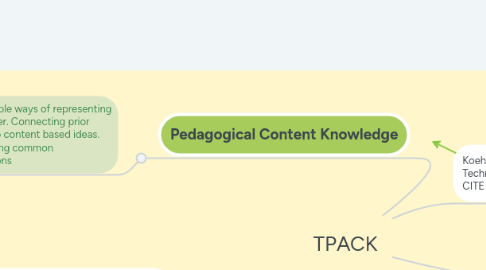TPACK
by Robyn Mooney


1. Made possible for teachers by technology coaching
1.1. Teachers who receive coaching in technology use and collaborate with peers will develop confidence and effectiveness in technology rich environments.
1.2. Three coaching methods
1.2.1. Cognitive
1.2.2. Instructional
1.2.3. Peer
1.3. Effective coaching includes
1.3.1. Context
1.3.2. Relevance
1.3.3. Ongoing
1.4. Beglau, M., Hare, J.C., Foltos, L., Gann, K., James, J., Jobe, H., Knight, J., Smith, B. (2011). Technology, coaching, and community. ISTE White Paper. [Special Conference Release]. http://www.instructionalcoach.org/images/downloads/ISTE_Whitepaper_June_Final_Edits.pdf
2. Technological Knowledge
2.1. Constant state of flux, in danger of becoming outdated before being published. Beyond computer literacy, more about how to use the technology to assist in achieving a goal.
3. Pedagogical Content Knowledge
3.1. Finding multiple ways of representing subject matter. Connecting prior knowledge to content based ideas. Acknowledging common misconceptions
4. Pedagogical Knowledge
4.1. A teacher's knowledge of methods of learning and teaching. An understanding of classroom skills and student's ability to learn
5. Technological Pedagogical Knowledge
5.1. Understanding how a variety of technology tools are developmentally appropriate for students
6. Technological Content Knowledge
6.1. The understanding of how technology can impact practices and knowledge of a specific discipline. The choice of the type of technology either aids or constrains the type of content that can be taught and visa versa
6.1.1. That is, understanding the influence technology and content have on each other will allow a teacher to choose the best suited technology for the content
7. Content Knowledge
7.1. Teachers should have an in depth understanding of the disciplines they teach
7.1.1. If they don't, students may receive incorrect information or develop misconceptions
8. Partnership Learning
8.1. Knight, J. (2002). Partnership Learning [Fieldbook]. The Teacher-Guided Professional Development Series. The University of Kansas Center for Research on Learning. https://www.horizonsd.ca/Services/Literacy/Documents/Partnership%20Learning%20Fieldbook%20Jim%20Knight.pdf
8.2. All areas of TPACK can be supposrted by partnership learning
8.3. Partnership Learning explains the importance of treating teachers like equals during decision making and professional development.
8.3.1. "Professional Development often fails because teachers frequently have little choice in what they learn"
8.3.2. "Taking away a teacher's right to say no is one way schools take away teachers' professionalism"

